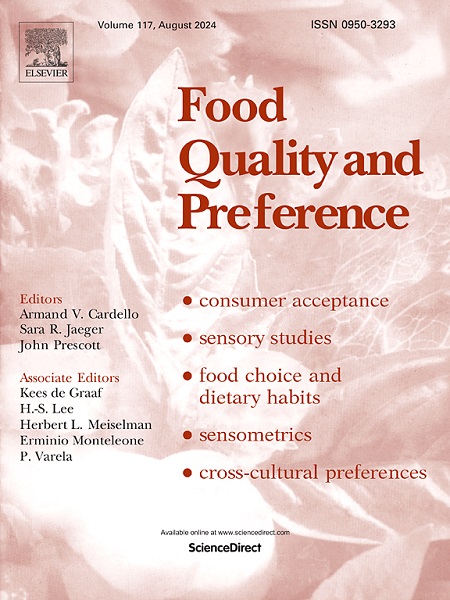大学生友谊网络中动物产品消费与饮食认同的社会动态
IF 4.9
1区 农林科学
Q1 FOOD SCIENCE & TECHNOLOGY
引用次数: 0
摘要
减少动物产品和肉类消费可以减缓气候变化,有利于健康和动物福利。由于饮食是高度社会化的,友谊网络可能会影响动物产品的消费,尤其是当年轻人在高等教育中建立新的关系时。以前的研究主要集中在感知社会规范或发现横断面证据将社会联系人的消费和饮食身份联系起来。在这里,我们使用纵向社会网络分析来检验与动物产品消费和饮食认同相关的动态社会机制——社会选择(选择朋友)和社会影响(朋友对行为的影响)。研究人员在12个月的时间里收集了荷兰大学生(n = 74)关于消费、饮食特征和友谊网络的三波数据。描述性统计表明,朋友之间的动物产品消费呈正相关(Moran's I网络自相关系数= 0.17-0.39)。纵向随机因素导向模型发现了社会选择的证据,但没有社会影响的证据。具体来说,学生更有可能与饮食特征相似的同龄人交朋友,而食用动物产品较少的学生更有可能被提名为朋友。朋友的行为不影响消费行为,但有一个减少肉类的家庭成员预测减少肉类消费。研究结果表明,动物产品消费聚集在学生网络中,部分原因是寻找饮食认同相似的朋友。我们讨论了这些发现如何有助于未来的研究和干预措施,以减少动物产品的消费。本文章由计算机程序翻译,如有差异,请以英文原文为准。
The social dynamics of animal product consumption and dietary identity in friendship networks of university students
Curtailing animal product and meat consumption can mitigate climate change and benefit health and animal welfare. As eating is highly social, friendship networks may influence animal product consumption, especially as young adults form new relationships in higher education. Previous studies have focused on perceived social norms or found cross-sectional evidence linking social contacts' consumption and dietary identities. Here, we used longitudinal social network analysis to examine dynamic social mechanisms – social selection (choosing friends) and social influence (friends' influence on behavior), related to animal product consumption and dietary identity. Three waves of data on consumption, dietary identities, and friendship networks were collected among Dutch university students (n = 74) over 12 months. Descriptive statistics indicated that animal product consumption positively correlated among friends (Moran's I Network Autocorrelation coefficient = 0.17–0.39). Longitudinal stochastic actor-oriented models found evidence of social selection but not social influence. Specifically, students were likelier to befriend peers with similar dietary identities, and students consuming fewer animal products were likelier to be nominated as friends. Friends' behavior did not influence consumption behavior, but having a meat-reducing household member predicted decreased meat consumption. The findings indicate animal product consumption clusters in student networks, partially driven by seeking friends with similar dietary identities. We discuss how the findings might contribute to future studies and interventions to reduce animal product consumption.
求助全文
通过发布文献求助,成功后即可免费获取论文全文。
去求助
来源期刊

Food Quality and Preference
工程技术-食品科技
CiteScore
10.40
自引率
15.10%
发文量
263
审稿时长
38 days
期刊介绍:
Food Quality and Preference is a journal devoted to sensory, consumer and behavioural research in food and non-food products. It publishes original research, critical reviews, and short communications in sensory and consumer science, and sensometrics. In addition, the journal publishes special invited issues on important timely topics and from relevant conferences. These are aimed at bridging the gap between research and application, bringing together authors and readers in consumer and market research, sensory science, sensometrics and sensory evaluation, nutrition and food choice, as well as food research, product development and sensory quality assurance. Submissions to Food Quality and Preference are limited to papers that include some form of human measurement; papers that are limited to physical/chemical measures or the routine application of sensory, consumer or econometric analysis will not be considered unless they specifically make a novel scientific contribution in line with the journal''s coverage as outlined below.
 求助内容:
求助内容: 应助结果提醒方式:
应助结果提醒方式:


